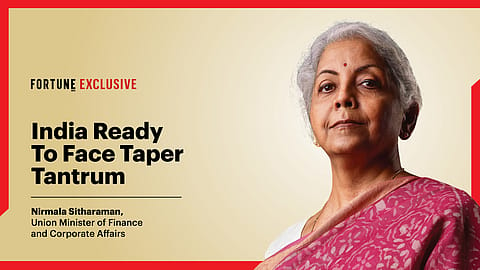India ready to face taper tantrum: Sitharaman
We are learning from 2008, and readying our systems for any sudden outflow of foreign investments, says finance minister Nirmala Sitharaman.

The Reserve Bank of India (RBI) and the Union finance ministry are keeping a watch on measures being taken by the US Federal Reserve (US Fed) and are ready to face any taper tantrum or sudden outflow of foreign investments, Nirmala Sitharaman, union minister of finance and corporate affairs, told Fortune India in an exclusive interview.
The government and the central bank have “definitely been in consultation, to keep a good watch on what is happening here and keep a good watch on the measures that the US Fed is taking,” says Sitharaman. “Whenever it happens, as and when it happens, we are ready because we are learning from the experience in 2008, and gradually readying our systems.”
The finance minister was referring to the 2008 global financial crisis which saw quantitative easing (where central banks, including the US Fed, pumped in liquidity into the system by purchasing assets) and a subsequent inflow of cheap funds into developing countries such as India. After quantitative easing was tapered off, the money that had flown into other countries were pulled back by investors, thereby resulting in a currency crisis in developing economies. A similar quantitative easing happened during Covid-19 and the fear is that any tapering announced by the U.S. Fed is likely to create a tantrum in economies such as India.
According to Sitharaman, foreign investments in India are part of a conscious decision by transnational corporations to de-risk their global value chains by diversifying supply sources instead of being China centric. “Global value chains cannot be put at risk of any kind of unforeseen (situation). When I am saying unforeseen, obviously it is something which you cannot take into calculation, but, unforeseen because of opacity in some areas, when economies or countries or governments operate less transparently,” she says.
The finance minister believes since the middle of last year, businesses have been increasingly feeling the need for review. “As a result, you search for destinations that are transparently governed, destinations that are far more predictable in terms of the way in which investments coming in and exiting can happen. So, by all those considerations India is definitely a favoured destination,” says Sitharaman.